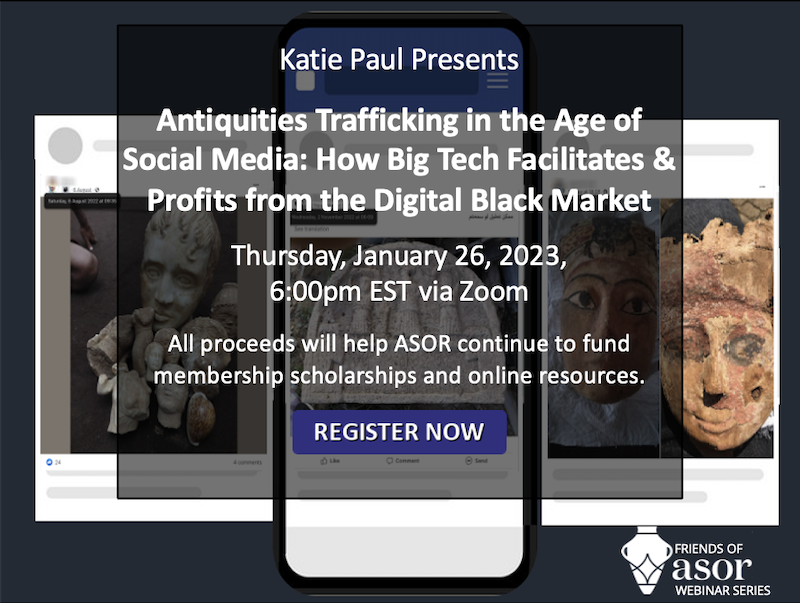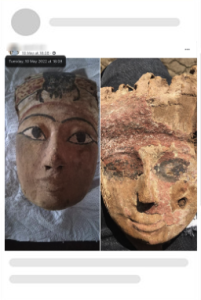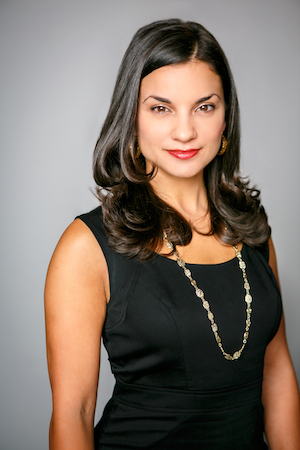
FRIENDS OF ASOR WEBINARS
Antiquities Trafficking in the Age of Social Media: How Big Tech Facilitates and Profits from the Digital Black Market
Friends of ASOR present the next webinar in our monthly series on January 26, 2023, at 6:00pm EST, featuring Katie A. Paul and moderated by Prof. Eric Cline. From the invasion of Ukraine to conflict in Syria, tech platforms like Facebook, YouTube, and TikTok have democratized global engagement in black markets. A new generation of tech-driven traffickers are capitalizing on Big Tech’s unregulated algorithms to maximize reach. Tech companies and traffickers alike profit from crime, providing monetization tools for antiquities looters to make money even without a sale.
When it comes to trafficking of cultural heritage and the financing of terrorism and organized crime, Big Tech platforms like Facebook and YouTube have provided digital toolkits that not only facilitate, but also accelerate the black market in cultural property while lining the pockets of both terror groups and tech companies alike.
Since 2018, the ATHAR Project has tracked networks of black-market antiquities trafficking groups across Facebook and other Big Tech platforms and documented thousands of artifacts trafficked in private and public Facebook groups to preserve critical evidence of looting and trafficking in the MENA region.
Technology companies have largely allowed traffickers and extremists to utilize these tools with impunity. The reach provided by Big Tech platforms has added a new dimension to terror finance and transnational crime, enabling illicit actors to more effectively traffic artifacts and finance their activities.
Facebook announced a ban of the trade of artifacts on its platform in June 2020. But a policy is only as valuable as its enforcement, and despite our multiple efforts to report antiquities trafficking content, Facebook makes no attempt to enforce their policy. Facebook is essentially knowingly facilitating the trafficking of cultural property that can amount to war crimes—and profiting from it.
No innovation of this kind has previously been so readily available to terror groups, transnational criminal organizations, or the average looter as it is today. The ATHAR Project’s years of research on Big Tech’s antiquities black market gives new insights into the next generation of traffickers and the type of regulation needed to reel in the growth of online black markets.
Join Katie Paul as she exposes the illegalities that lurk in plain sight on your favorite social media platforms. The webinar will conclude with a live Q&A session moderated by Prof. Eric Cline (The George Washington University).
Katie A. Paul (@AnthroPaulicy) is an anthropologist and investigative researcher who serves as the director of the Tech Transparency Project (TTP), where she specializes in tracking extremism, disinformation, and criminal activity on online platforms such as Facebook. She also serves as co-director and co-founder of the Antiquities Trafficking and Heritage Anthropology Research (ATHAR) Project and a founding member of the Alliance to Counter Crime Online (ACCO) where she focuses on trafficking, terror finance, and organized crime facilitated by Big Tech platforms.
Previously, Katie served as chief of staff and a research fellow at the Antiquities Coalition, a Washington, DC-based non-profit dedicated to combating cultural racketeering. She holds a bachelor’s degree from Miami University (OH) with a double major in Anthropology and Ancient Greek and earned an M.A. in Anthropology at The George Washington University.
This webinar will be recorded and all paid registrants will be sent a link to view the recording.

Season Pass: ASOR Sustaining Members: $0 | ASOR Members: $75 | Public: $150
Buy one here!
To receive your ASOR member discount, log into the online store. If you are new to ASOR, please click on the “New Visitor Registration” link to register your e-mail address and choose a password for our online store. Once logged in, navigate to “Meeting and Event Registration” to register for the webinar and pay the fee. Each paid registrant will receive a confirmation e-mail when you pay for the webinar. If you do not receive this e-mail, then you are not registered. Please e-mail membership@asor.org with any questions or issues with registering.
You will be e-mailed the Zoom Webinar link in the week prior to the lecture on January 26, 2023. If you do not receive the link by the close of business two days before the webinar, please e-mail membership@asor.org immediately. This webinar will be recorded and all paid registrants will be sent a link to view the recording.
All proceeds from this webinar are used to fund scholarships for members as well as increasing ASOR’s online resources, which are free to the public.
READY FOR A WEBINAR SEASON PASS?
Buy a season pass for all the webinars* of the 2022-2023 FOA Webinar Season! 1) You will automatically receive the Zoom link for each webinar so no need to register each time. 2) You will also receive the recording of each webinar automatically after the event.
If you have missed webinars earlier in the season and still want to buy the pass, you will receive the links to the recordings of the webinars you missed in your automatic confirmation email after you buy the pass.
*Special symposiums may be excluded from the season pass price.
No more registering for a year if you buy your pass today!
Pricing:
Members: $75.00
Non-Members: $150.00
ASOR Sustaining Members: $0 (automatic registration for each webinar)
Not a member yet? Click here to join as a member and receive the 50% off a season pass!
Log into our online store to purchase the season pass for 2022-2023. If you are new to ASOR and do not have a record in our store yet, click here to register. After you login, navigate to the left to “Meeting and Event Registration.” Please e-mail membership@asor.org if you have any questions or issues.
WHY SPONSOR A WEBINAR?
Several levels of support from $50-$1,000 are available. Proceeds go towards membership scholarships and towards increasing ASOR’s virtual resources. Each sponsorship is tax-deductible and you can give your friends free registrations to a webinar!
Bronze Level ($50): up to 2 guest registrations
Silver Level ($100): up to 5 guest registrations
Gold Level ($500): up to 20 guest registrations
Platinum Level ($1,000): up to 50 guest registrations
After you sign up for a sponsorship online or over the phone, email the names and email addresses of your guests to Felice Herman at membership@asor.org, who will send your guests a confirmation and the Zoom link before the webinar.
WANT TO SAVE $6.00 ON THE NEXT WEBINAR?
Join ASOR as a member! Click here for more details about discounts for events and other benefits of membership. Memberships start at $40 for the year as an Associate Member.
Not ready to join yet? Become a Friend of ASOR for FREE!
PAST WEBINARS
You can now purchase the link to the recording of any webinar. You can also purchase the bundle packages of all webinars from the 2020-2022 seasons. Please e-mail membership@asor.org for purchase details.
To see a printable pdf of the webinar titles from the 2020-2021 season, please click here. To see a printable pdf of the webinar titles from the 2021-2022 season, please click here.
Pricing:
Members: $6.00 per recording
Non-Members: $12.00 per recording
Bundle of 2020-2021 Webinars: $75.00
Bundle of 2021-2022 Webinars: $75.00
Bundle of 2020-2022 Webinars: $125.00
2021-2022 Season
A World at War: Protecting Cultural Heritage in Times of Conflict
Patty Gerstenblith (DePaul University), Lisa Ackerman (Columbus Citizens Foundation), Andrew Cohen (Government Professional and Cultural Heritage Expert) | May 12, 2022
Preserving Cultural Heritage in Hisban and Umm al-Jimal, Jordan
Øystein LaBianca (Andrews University), Elizabeth Osinga (Umm al-Jimal Archaeological Project), Darrell Rohl (Calvin University) | April 24, 2022
Back to the Field: Recent Discoveries & Summer Plans 2022
Lorenzo d’Alfonso (ISAW), Kathryn Grossman (NC State University), James R. Strange (Samford University) | April 3, 2022
Uncovering What is Nubian Beneath the Veneer of Egyptianness: Excavating the Archives
Debora Heard (University of Chicago) | March 20, 2022
Where Are They Now?: A Preview of 2022 ASOR-Affiliated Fieldwork Projects
Michael Given (University of Glasgow), Xenia-Paula Kyriakou (Florida Gulf Coast University), Stephen Batiuk (University of Toronto), Monique Roddy (Walla Walla University), Kent Bramlett (La Sierra University), Friedbert Ninow (La Sierra University), and Michael Hoff (University of Nebraska-Lincoln) | March 8, 2022
Excavations at Tel Gezer: A Personal Story
Sam Wolff (Tel Gezer Laboratory) | February 20, 2022
Tel Rehov: A Major Bronze and Iron Age City in the Jordan Valley
Amihai Mazar (Hebrew University of Jerusalem), Nava Panitz-Cohen ( Hebrew University of Jerusalem), Nota Kourou (Athens University), Naama Yahalom-Mack (Hebrew University of Jerusalem), Robert Mullins (Azusa Pacific University) | February 10, 2022
The Not-So-Innocents Abroad: The Beginnings of American Biblical Archaeology
Rachel Hallote (Samford University) | January 20, 2022
Synagogues as Jesus Knew Them
James R. Strange (Samford University) | December 2, 2021
Under Jerusalem: The Buried History of the World’s Most Contested City
Andrew Lawler | November 4, 2021
Jesus and Jerusalem on TV: How Do Bible Documentaries Get Made?
Robert Cargill (University of Iowa) | October 17, 2021
Digging the Divine?: Judahite Pillar Figurines and the Archaeology of Israelite Religion
Erin Darby (University of Tennessee) | October 7, 2021
David, Solomon, and Rehoboam’s Kingdom—The Archaeological Evidence
Yosef Garfinkel (Hebrew University of Jerusalem) | September 19, 2021
From Standing Stones to Sacred Emptiness: Textual and Visual Portrayals of Israel’s God
Theodore Lewis (Johns Hopkins University) | August 29, 2021
2020-2021 Season
Making May Matter: Webinarathon to Endow Diversity
Multiple Speakers | May 21-23, 2021
Archaeogaming: Why Video Games Deserve Their Own Archaeology
Tine Rassalle (University of North Carolina at Chapel Hill), Shannon Martino (Morton College), Matthew Winter (University of Arizona), Michael Zimmerman (Rhode Island) | April 18, 2021
How the Bible Became a Book
William Schniedewind (UCLA) | March 21, 2021
The Mysteries of Mithras in Caesarea: Exploring the Cult’s Rites and Remains
Jane DeRose Evans (Temple University), Alexandra Ratzlaff (Brandeis University) | March 11, 2021
Archaeology and the Hidden Religious Culture of Israelite Women
Carol Meyers (Duke University) | February 21, 2021
Meet the Directors—Fundraiser to Support ASOR’s Affiliated Overseas Research Centers
Matthew J. Adams (AIAR), Pearce Paul Creasman (ACOR), Lindy Crewe (CAARI) | February 11, 2021
Early Synagogues, Jesus, and Galilee—A Jewish Perspective
Eric Meyers (Duke University) | December 13, 2020
Home Sweet Home: Ancient Israelite Households in Context
Cynthia Shafer-Elliott (William Jessup University) | October 18, 2020
Priestesses in the Days of Solomon and Ahab
Susan Ackerman (Dartmouth College) | September 13, 2020
Digging Deeper: How Archaeology Works
Eric H. Cline (The George Washington University) | August 9, 2020
American Society of Overseas Research
The James F. Strange Center
209 Commerce Street
Alexandria, VA 22314
E-mail: info@asor.org
© 2023 ASOR
All rights reserved.
Images licensed under a Creative Commons Attribution-NonCommercial-ShareAlike 4.0 International License
COVID-19 Update: Please consider making payments or gifts on our secure Online Portal. Please e-mail info@asor.org if you have questions or need help.



